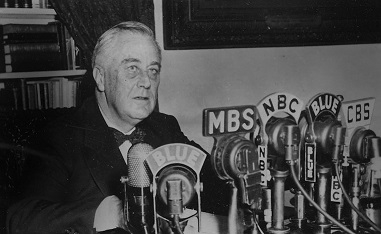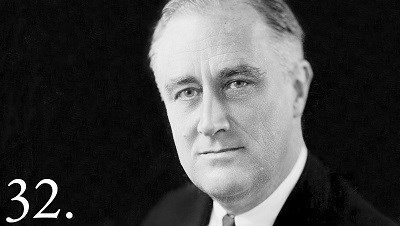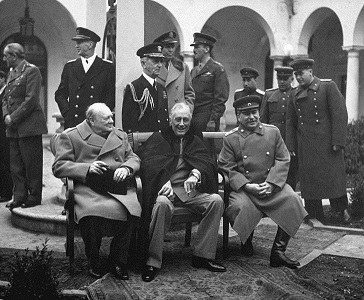The only person to ever serve four terms in the White House was a man named Franklin D. Roosevelt, known to many as FDR. He once said, "Men are not prisoners of fate, but only prisoners of their own minds." Roosevelt truly lived his life by those very words. FDR was born on January 30, 1882 in Hyde Park, New York to a quite wealthy family. As an only child, he often followed his parents on travels abroad. When he was young, Roosevelt was tutored by his parents, but eventually, he attended Harvard University, where he was extremely popular; this left him no time for academics. On March 17, 1905, he married Eleanor Roosevelt, his fifth cousin, once removed. When FDR decided to run for state senator of New York in 1910, his political career took off.
 |
| One of his signature "Fireside Chats" (americanradioworks.org ) |
Franklin D. Roosevelt (FDR) is a hero because of his resilience, despite all the different challenges he faced. In August 1921, Roosevelt's life was changed forever when he was diagnosed with polio, a disease that paralyzed his legs and caused much distress in his life. However, with the support of those closest to him, Roosevelt focused on "overcoming his disability...over time, his hardship helped make him a stronger person. Eleanor later wrote, 'He soon discovered that the way to lighten all burdens is to take them cheerfully'" (Burgan). Many people would let such a tragic event ruin their lives, but Roosevelt did not. He simply adjusted, training his body to do things differently while remaining his cheerful, energetic, and independent self. President Roosevelt worked during times of trouble, so he often passed legislation quickly and decisively. As a result, Americans began to criticize the way the White House was run; others opposed his policies."Roosevelt made a point of explaining all these programs to the American public via informal radio broadcasts, 'fireside chats' as they were called. They added immeasurably to his popularity and gave him the opportunity to appeal directly to the people in a manner that conveyed warmth and sincere concern for their well-being" (Burgan). Roosevelt faced lots of pressure from the American people to change his ways. However, he did not back down, nor did he respond harshly; instead, he adapted to the situation. By kindly explaining his programs, he earned citizens' respect and shook off criticism. Franklin Roosevelt had plenty of struggles during his life; however, his ability to be flexible and adjust to a variety of situations makes him a hero.
 |
| 32nd President of the United States (whitehouse.gov ) |
Franklin Roosevelt is a hero because of the leadership skills he demonstrated as president. FDR was president during some of the roughest times in American history. When he took office in 1932, the United States was going through an economic depression; many citizens were unemployed and banks were failing. "Franklin Roosevelt was energetic and an efficient administrator. He specialized in business operations, working with Congress to get budgets approved and systems modernized" (Biography.com). FDR realized that a lot needed to be done to fix the problems the US was facing, and he did exactly that. He was able to propose legislation and get it passed through Congress. In fact, he passed more legislation in the first hundred days of his presidency than any other president in the history of the United States. Even though he was a Democrat, many Republicans listened to his ideas and agreed with him; Roosevelt was able to unite people behind a common goal, fixing their country. FDR passed many measures as president, but it is important to understand how these laws and programs helped the American people. "The federal government in 1935 guaranteed unions the right to organize and bargain collectively, and the Fair Labor Standards Act of 1938 established a mechanism for putting a floor under wages and a ceiling on hours that continues to this day. It provided, in 1935, financial aid to the aged, infirm, and unemployed when they could no longer provide for themselves. Beginning in 1933, it helped rural and agricultural America with price supports and development programs when these sectors could barely survive" (Millercenter.org). Roosevelt tried his best to make sure no Americans were left behind. He often passed laws to help those most in need, because he believed in equality for all citizens. Some of his strongest measures are still in effect to this day. Franklin Roosevelt was able to get things done because of his leadership ability; this made him a hero not only to Americans, but to many all around the world.
 |
| Negotiating at the Yalta Conference (worldwarii.org ) |
Franklin Roosevelt is a hero because he is an inspiration; he captured many hearts during his time as president. When FDR passed away in April 1945, people were shocked and disheartened at such a loss. "the genuine affection millions of ordinary citizens felt for the man who had appeared on the national scene with an infectious grin and seemingly boundless energy at a time when everyone and everything was mired in despair and lethargy...'never seemed overwhelmed by his burdens.... He was a rock of security and confidence in a world of chaos.' He was also a hero who never allowed himself to be defeated by self-pity just because polio had taken away the use his legs" (Contemporary Heroes and Heroines). FDR was a true role model; his actions emboldened Americans to stand strong through the ups and downs of life. Roosevelt truly showed people that no matter what obstacles life throws at you, your life is still what you make of it. Through his policies and actions, Roosevelt transformed the role of a president in the lives of everyday Americans. "Through his 'fireside chats,' delivered to an audience via the new technology of radio, FDR built a bond between himself and the public-doing much to shape the image of the President as the caretaker of the American people. Under FDR's leadership, the President's duties grew to encompass not only those of the chief executive-as implementer of policy-but also chief legislator-as drafter of policy...In sum, President Roosevelt greatly increased the responsibilities of his office. Fortunately for his successors, he also enhanced the capacity of the presidency to meet these new responsibilities" (Millercenter.org). Before Roosevelt, the job of a president was to ensure the welfare of a country; however, FDR took it one step further by ensuring the welfare of the people. He truly treated the presidency as a personal relationship with the people of America. Through his actions, people could tell that he wanted to be president - not just for the power, but for the American people that he served and cared for. FDR was a great president, but also an encouragement to many; he provided a spark in a seemingly dark world.
FDR was resilient because of the way he was able to respond to all the different circumstances of life. In addition, he was a leader not only because of his confidence, but also because of his flexibility; he had a constant desire to get more things done. Lastly, he was an inspiration to Americans; what he did aside from his political life touched many people. Resilience, leadership, and inspiration are what make Franklin D. Roosevelt a true hero.
Works Cited
Biography.com Editors. "Franklin D. Roosevelt Biography." The Biography.com Website.
A&E Networks Television, n.d. Web. 27 Apr. 2016.
<http://www.biography.com/people/franklin-d-roosevelt-9463381#early-life>.
Burgan, Michael. "Franklin D. Roosevelt." Franklin D. Roosevelt (0-7565-0203-9) (2002): 6.
Biography Reference Center. Web. 28 Apr. 2016.
"Franklin Delano Roosevelt." Contemporary Heroes and Heroines. Vol. 2. Detroit: Gale, 1992.
Biography in Context. Web. 26 Apr. 2016.
"Franklin D. Roosevelt: Impact and Legacy." Millercenter.org. Ed. William E. Leuchtenberg.
Miller Center of Public Affairs, University of Virginia, n.d. Web. 28 Apr. 2016.
Page created on 5/22/2016 12:00:00 AM
Last edited 5/22/2016 12:00:00 AM
